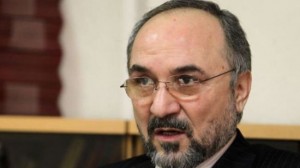 An Iranian ambassador to the UN has reiterated Tehran�s opposition to a potential military strike against Syria, urging all countries to wait and let the UN chemical weapons inspectors, who were in Syria to probe sites of chemical attacks, complete their work.
An Iranian ambassador to the UN has reiterated Tehran�s opposition to a potential military strike against Syria, urging all countries to wait and let the UN chemical weapons inspectors, who were in Syria to probe sites of chemical attacks, complete their work.�We are against any foreign military intervention, which will damage the efforts aimed at finding a political solution for the conflict in Syria,� Mohammad Khazaei said in an e-mailed statement to the�New York Times.
A 20-member UN team of chemical weapons inspectors - led by Ake Sellstrom and Angela Kane - arrived in Damascus last week. The team is currently leaving Syria after having completed �its collection of samples and evidence,� according to the UN.
Khazaei criticized the United States and France for moving missile-armed warships closer to the Syrian coast in the Mediterranean Sea.
�We believe that missiles have never been peace messengers in the Middle East and the rest of the world,� the Iranian envoy stated.
The US Navy has deployed a sixth destroyer to the eastern Mediterranean as Washington is mulling over a possible attack on Syria.
Khazaei further expressed Iran�s opposition to the use of chemical arms.
�Iran, as a main victim of use of chemical weapons, is against any kind of usage of this inhuman warfare,� he pointed out.
The rhetoric of war against Syria primarily intensified after foreign-backed opposition forces accused the government of Syrian President Bashar al-Assad of launching a chemical attack on militant strongholds in the suburbs of Damascus on August 21.
A number of Western countries, including the United States, France, and the UK, were quick to engage in a major publicity campaign to promote war against Syria despite the fact that Damascus categorically rejected the claim that it has been behind the attack.
On Wednesday however, the British government, the United States� closest ally, announced that its support for military intervention in Syria would require a second vote in the country�s parliament.
A first non-binding vote in the British legislature on August 29 rejected a British role in a potential war on Syria.
On Friday, August 30, NATO also distanced itself from participating in any military intervention in Syria, with the chief of the Western military coalition, Secretary General Anders Fogh Rasmussen, saying he did not �foresee any NATO role� in an international war on Syria.
Nevertheless, Washington has remained defiant, saying that it is willing to go ahead with its plans for a strike on Syria without the approval of the United Nations or even the support of its allies.
Syria has been gripped by deadly unrest since 2011. According to reports, the Western powers and their regional allies -- especially Qatar, Saudi Arabia, and Turkey -- are supporting the militants operating inside Syria.
Iran, Russia, and China, as well as the United Nations, have warned against war.
By Press TV
The Iran Project is not responsible for the content of quoted articles.










